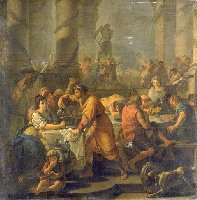Io Saturnalia!

This is the first of my Xmas posts on pre-christian Xmas festivals (with added christmas song goodness). As you may have guessed most of these pre-christian festivals are based on the winter solstice. Saturnalia was the Roman winter solstice festival where they celebrated the rededication of the temple to the god Saturn. Saturn's staue was hollowed out and filled with olive oil (as a symbol of his agricultural deification) and his feet which had previously been bound, were unbound at this time. The binding was to ensure Saturn's subordinance to Jupiter, while the loosening symbolized Jupiter's free reign during Saturnalia.
Traditionally this festival started on the 17th December (our calendar - in the Julian calendar this would be around the 25th December) and lasted anything from three to seven days, depending on the decree of the current Emperor. The celebrations included school holidays, slaves were allowed to gamble (see how nice the Romans were?) and even role-reversal in that the masters often served the slaves a banquet. This also involved the slaves wearing a red, felt pileus cap - the symbol of a freed slave - , not unlike that which Santa Claus wears.
Practices that carry over to the present day include the exchanging of gifts on Sagillaria, the last day of Saturnalia, singing holiday songs (in the nude), decorating the house with candles(to signify the return of the sun after the solstice?) - even cutting down evergreen trees, decorating them and dedicating them to Saturn. According to Wiki this was to honour the fact that evergreens remain alive during the harsh winters. I'm sure the irony was not lost on the poor evergreens as the axe bit into their trunks.
In essence, Saturnalia was much like the Christmas that most of us practice today. I wonder who are/were more pious in relation to their religious festival; the Christians at Christmas or the Romans at Saturnalia? So how did Christmas replace Saturnalia? At this point the only Christian festival was Easter, probably the most important of the Christian celebrations. It is thought that the Christian church decided to nominate the 25th of December as Christ's birthday in order to usurp Saturnalia. Much of Rome was Christian by then and it was probably easy to push this through in favour of a pagan celebration. Of course this may be perceived as doing Christianity a disservice, but I think it's fairly clear Christ wasn't born on 25th December. It's also quite interesting that essentially the festivals were very similar in the way they were celebrated and really all that's changed (apart from naked Carol singing) is the deity.
Royal Philharmonic Orchestra - Saturn, the Bringer of Old Age (www / buy)
Kristin Hersh - Jesus Christ (www / buy)
Technorati Tags:christmas, xmas, saturnalia, roman, festival, saturn, christ, saturn, gods, religion








